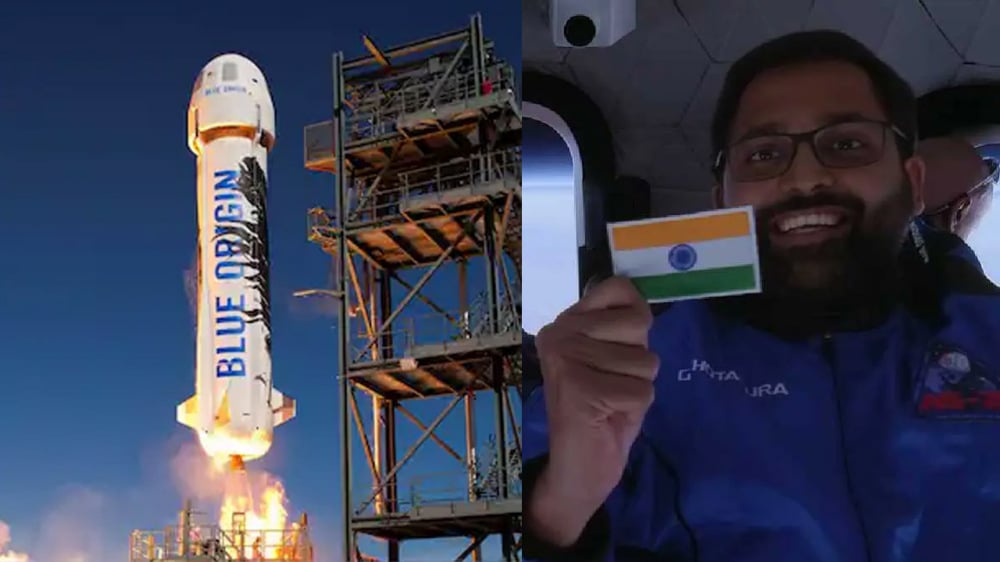
The second name is 'Gopichand Thotakura' along with Rakesh Sharma, Kalpana Chawla and Sunita Williams. However, Thotakura is different from these three astronauts in that he went to space at his own expense and not at government expense. Thotakura is India's first astronaut. He traveled to space in Blue Origin's NS-25 space flight. He recently returned to India. At the same time, Blue Origin's next space flight, NS-26, will be launched on August 29. The owner of this company is Amazon founder Jeff Bezos.
first Indian civilian astronaut
After Rakesh Sharma, Captain Gopichand Thotakura is the second Indian citizen to travel to space. His name is recorded as India's first civilian astronaut. Gopichand Thotakura has returned home after a successful journey to space. After coming to Delhi, he also met Vice President Jagdeep Dhankhar.
Part of the crew team of the New Shepard-25 (NS-25) mission
Thotakura was part of the crew team of Blue Origins New Shepard-25 (NS-25) mission, which traveled to space under space tourism. At the same time, Jeff Bezos' company has completed preparations for the next space flight New Shepard-26 (NS-26). The mission will leave for space on August 29 with six people. This can be seen as a growing craze of space tourism.
Gopichand Thotakura's space journey a historic achievement
Gopichand Thotakura's space journey is a historic achievement, making him the second Indian citizen to travel outside the Earth's atmosphere. The first was Wing Commander Rakesh Sharma, a former Indian Air Force pilot. He stepped into space in 1984. Thotakura's journey reflects India's growing presence in the global space community. It also highlights the possibilities of future space tourism.
Who is Gopichand Thotakura?
Entrepreneur and pilot Gopichand Thotakura flew into space as a tourist on Blue Origin's New Shepard-25 mission on May 19, 2024. The mission returned safely to Earth after a brief stay in space. Thotakura, a businessman and avid traveler, graduated from Embry-Riddle Aeronautical University.
People can travel to space with Shepard rocket
Blue Origin is a private aerospace company that provides ordinary people like Thotakura the opportunity to travel into space. Its owner is Jeff Bezos, the founder of the famous e-commerce platform Amazon. He founded this company in 2000. This company provides people the service of traveling into space through the New Shepard rocket.
Blue Origin sends humans into space for the first time since New Shepard
On July 20, 2021, Blue Origin launched the first man into space from New Shepard. This mission was called Blue Origin NS-16, under which four people went to space. Apart from Jeff Bezos, it includes Mark Bezos, Wally Funk and Oliver Daemon.
New Shepard NS-26 Mission
If all goes well, on August 29, Blue Origin will launch the next manned space flight under the New Shepard NS-26 mission. The new reusable Shepard rocket-capsule combo will be used for the suborbital space tourism mission NS-26. The mission will launch from a launch pad located at Blue Origin's West Texas site.
Six people will fly under the NS-26 mission
Six people will fly on the Blue Origin NS-26 mission. These include entrepreneur Nicolina Elrich, university professor Rob Farrell, businessman Eugene Green, cardiologist Dr. Iman Jahangir, college student Carson Kitchen and entrepreneur Ephraim Rabin.
New Shepard Rocket
The New Shepard rocket is named after Alan Shepard, the first American astronaut to go into space. This rocket from Blue Origin is a reusable suborbital rocket system. It has been designed from the ground up for humans to travel into space.
How much does it cost to go into space?
New Shepard flights last 10 to 12 minutes from takeoff of the crew capsule to parachute landing. Blue Origin has not disclosed how much it charges for a seat on the suborbital mission. To book seats, one can visit its official website.
 look news india
look news india